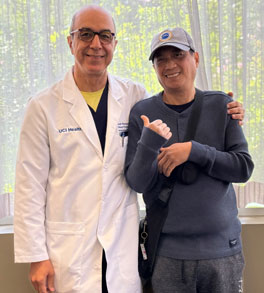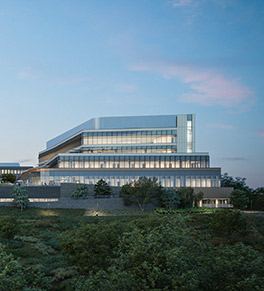
Mastectomy and Lumpectomy
Our approach to mastectomy and lumpectomy
If you have breast cancer, breast cancer surgery is often the first step in your breast cancer treatment. In certain cases, you may need other treatment first, such as chemotherapy or radiation, to shrink the tumor before surgery.
At your first appointment, your UCI Health breast cancer surgeon will discuss your breast cancer surgery options, including:
- Lumpectomy: Also known as breast-conserving surgery, your surgeon will remove the tumor, along with a certain number of lymph nodes. With a lumpectomy your breast will remain intact.
- Mastectomy: During a mastectomy, your surgeon will remove your entire breast — or both breasts (known as a double mastectomy). Your surgeon will also remove a certain number of lymph nodes. You’ll also have the option of having breast reconstruction after mastectomy.
Your surgeon will discuss the risks and benefits of each option. Together, you’ll decide which breast surgery is right for you.
Lumpectomy vs. mastectomy
Your breast surgeon will partner with you to make a decision about breast cancer surgery.
Our goal is often to conserve as much of your breast tissue as possible. And studies have found that a lumpectomy followed by radiation has the same cancer recurrence rate as a mastectomy.
But we know every person and breast cancer is different.
That’s why we factor in all aspects of your health and personal preferences to determine your breast surgery plan.
This starts by discussing:
- The cancer type and tumor size
- Whether the cancer has spread beyond the breast
- Your medical and family history
- Your risk of the cancer returning (cancer recurrence)
- Your personal needs and preferences
What to expect
Once you and your surgeon have agreed upon your surgical plan, you’ll meet with a nurse navigator.
Your nurse navigator will be your main point person. They’ll:
- Schedule your surgery
- Coordinate any additional tests or imaging needed before surgery
- Coordinate follow-up appointments
- Help you understand what to expect before, during and after your mastectomy or lumpectomy
- Answer your questions
Lymph node removal
During breast cancer surgery, your surgeon will remove some lymph nodes to determine if the breast cancer has spread.There are two types of lymph node removal procedures:
- Sentinel lymph node biopsy: Your surgeon will remove several lymph nodes closest to your tumor to see if the cancer has spread.
- Axillary lymph node dissection: Your surgeon may remove up to 20 lymph nodes if they suspect or have confirmed the cancer has spread.
Your surgeon will try to remove as few lymph nodes as possible. But sometimes they may need to remove more depending on the type and stage of the cancer.
Lymphedema prevention
One of the biggest concerns with breast cancer surgery is lymphedema.
Lymphedema is permanent arm swelling that can happen after your surgeon removes lymph nodes. There’s a higher risk of developing lymphedema if you’ve had an axillary lymph node dissection.
However, the groundbreaking lymphedema prevention program at UCI Health significantly reduces your risk of developing lymphedema.
If you need an axillary lymph node dissection, a UCI Health microsurgeon will be involved in your lumpectomy or mastectomy. If needed, your microsurgeon can perform a procedure to repair your lymphatic system after lymph node removal.
Since the launch of this program, lymphedema rates at UCI Health have decreased from 40%-50% to just 5%-10%.
Breast reconstruction
If you’re having a mastectomy to remove one or both breasts, your surgeon will discuss your breast reconstruction options with you. During breast reconstruction, a plastic surgeon can rebuild your breasts.
Plastic surgeons at UCI Health offer the full range of options for breast reconstruction after mastectomy:
- Implant-based reconstruction uses silicone or saline breast implants to restore the shape and volume of your breasts
- Autologous breast reconstruction uses your own tissue (often from your abdomen or buttocks) to rebuild your breasts
You can also typically choose when you want to have breast reconstruction:
Immediate breast reconstruction: Our plastic surgeons and breast surgeons work together to perform breast reconstruction at the same time as your mastectomy.
Delayed reconstruction: In some cases, you may need or choose to have breast reconstruction in a separate procedure after your mastectomy.

Make an Appointment
Our cancer specialists provide expert care for all types of cancers.
Why choose UCI Health for a mastectomy or lumpectomy?
Our surgeons can see you now
Our goal is to get you in to see a breast surgeon within two business days. We offer appointments at our convenient locations in Costa Mesa, Irvine, Orange and Yorba Linda.
Your personal nurse navigator
Your nurse navigator will guide you through all aspects of your breast cancer surgery. They’ll walk you through every step of preparation, surgery and recovery. You’ll also have a direct line to reach your nurse navigator with any questions, concerns or needs throughout treatment.
Surgeons who specialize in breast cancer
All UCI Health breast surgeons are specifically trained in breast cancer surgery; it’s all they do. They also sit on committees and participate in and lead clinical trials looking at new ways to treat breast cancer. This level of expertise ensures you receive the most advanced, experienced care for a mastectomy or lumpectomy.
Nationally recognized breast cancer care
At UCI Health, we make sure you have access to the breast cancer surgery, treatments and services you need to thrive. This includes access to breast cancer clinical trials, a nurse navigator and genetic testing and counseling. These services and more are some of the reasons we’re designated as a National Accreditation Program for Breast Centers.
Featured Blog Posts
Weight loss is better together
Sisters undergo bariatric surgery, drawing inspiration from each other to shed pounds and improve health.

Drummer beats back kidney cancer in clinical trial
Glenn Marquez is hitting the skins again after enrolling in a clinical trial to treat advanced renal cell carcinoma.

Reimagining cancer care for all of Orange County
When it opens July 16, the Chao Family Comprehensive Cancer Center’s newest location will offer superior care, comfort and convenience.




